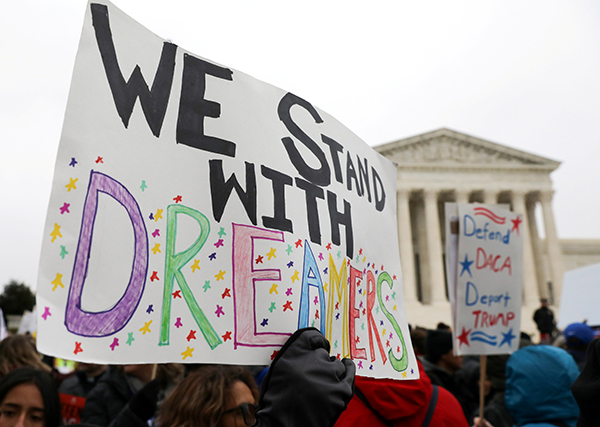
WINDSOR TERRACE — Many people are breathing a little easier in the Diocese of Brooklyn these days.
A ruling issued by a Brooklyn federal judge ordering the U.S. Department of Homeland Security to cease its efforts to chip away at a popular Obama-era program — that allows young adults brought illegally into the country to stay when they were children — is being hailed by immigrant rights advocates here.
“This is just tremendous. We’re very excited,” said Father Ruskin Piedra, executive director of the Juan Neumann Center. The center, housed at the Basilica of Our Lady of Perpetual Help, Sunset Park, provides a wide variety of services to the immigrant community, including legal assistance in fighting deportation.
In a decision handed down on Dec. 4, Judge Nicholas Garaufis of the U.S. District Court for the Eastern District of New York overruled a memorandum issued by Acting DHS Secretary Chad Wolf in July. Wolf had ordered the agency to stop accepting new applications for the Deferred Action Against Childhood Arrivals program.
The program, known as DACA, was put into effect through an executive order by President Barack Obama in 2012 and allowed young adults who entered the country illegally with their parents and guardians when they were children to apply for protected status with the U.S. government.
Young people brought into the country illegally as children are commonly known as Dreamers. In 2018, the Mayor’s Office of Immigrant Affairs estimated that 55,000 Dreamers lived in Queens and 46,000 residing in Brooklyn.
DACA does not grant citizenship, but it does allow immigrant young adults to live and work in the U.S., get health insurance, and attend college without fear of deportation. In 2019, there were approximately 661,000 DACA recipients in the U.S., according to the Center for American Progress.
“In their hearts, they are American,” said Carlos Apestegui, a parishioner of Queen of Angels Church, Sunnyside.
Apestegui, a native of Peru, is not a DACA recipient but said he feels sympathy for young adults in that position. “This is the only country they know. They came here so young. They had no choice,” he told The Tablet.
Judge Garaufis also ordered DHS to restore all aspects of the DACA program that had been in place before September of 2017, when the Trump administration began making moves to dismantle the program.
The judge’s decision went into effect on Dec. 7.
Ligia Guallpa, executive director of the Worker’s Justice Project, an immigrant rights organization based in Brooklyn, said she was pleased with the ruling. “This victory is very symbolic and meaningful. This victory belongs to all of the young people who fought to stay here,” she told The Tablet.
Dreamers have proven that they deserve to remain in the U.S., Guallpa said.
“They were raised in our nation, and they have contributed economically,” she told The Tablet. “There are DACA recipients doing essential work during the pandemic,”
According to the mayor’s Office of Immigrant Affairs, Dreamers contributed $4.7 billion into New York City’s gross domestic product in 2018.
Father Piedra’s phone has been ringing non-stop since the latest ruling. “People are calling looking for information on DACA. Word gets around,” he told The Tablet.
The phones are also ringing at St. Brigid’s Immigration Services Center in Bushwick, where Msgr. James Kelly, the executive director, is busy helping young adults navigate DACA paperwork.
“We are getting a lot of calls,” he told The Tablet. “We have been telling people to apply.”
Msgr. Kelly, a lawyer, has been reviewing the eligibility requirements with an eye out for any pitfalls they may contain for DACA applicants. To qualify, applicants must prove that they have continuously lived here in the U.S. since June 15, 2007. They must also prove that they were younger than 31 on June 15, 2012 — the date DACA first went into effect.
Msgr. Kelly said applicants have to produce either a high school diploma or currently be enrolled in a General Education Diploma program. One arrest for a minor offense won’t derail a DACA application.
“But if you have a lot of minor offenses on your record or if you are convicted of a grave offense, your application will probably be rejected,” he said.
Judge Garaufis’ ruling came six months after the U.S. Supreme Court rejected an attempt by the Trump Administration to eliminate DACA. In a 5-4 decision issued on June 18, the justices ruled that the administration did not provide adequate reasoning for getting rid of the program.
While immigrant rights advocates applauded the latest court victory, they said their joy is tempered somewhat.
“DACA is not enough. It was put in only as a short-term solution. It’s time to give the Dreamers a permanent solution,” Guallpa said.
Msgr. Kelly said the legislation is needed to protect Dreamers.
“DACA is not the law. It was put in by an executive order. There is no path to citizenship yet,” he said.
Father Piedra also called for federal legislation to settle the issue once and for all. “It’s not the end of the road yet,” he said.
